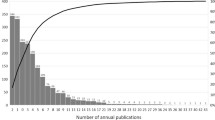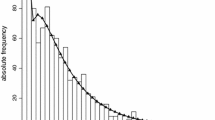Abstract
This research was conducted on a sample of 840 respondents who represent half of the Croatian population of young scientists. There are three main features which define the publication productivity of young scientists. 1) Despite the worsened position of R & D, they publish more scientific papers than the young generations of scientists at the beginning of the nineties. 2) Differences between a highly-productive minority, which produces on average half of all scientific publications, and a low-productive majority is already apparent in young scientists. 3) The productivity of young scientists is formed according to productivity patterns typical of particular scientific fields and disciplines.
With regard to the explanation of productivity, the following has been found. a) An expansion of the set of predictors resulted in an improvement in the explanation of the productivity of young scientists compared with previous surveys. b) Among the factors which contribute significantly to the explanation of the quantity of scientific publications, the most powerful predictor is attendance at conferences abroad, followed by scientific qualifications and some gatekeeping variables. c) Besides certain similarities, scientific fields also show a specific structure of determinants of young scientists' productivity.
Similar content being viewed by others
References
G. M. Dobrov, Potencijal nauke (Scientific Potential), Institut za naučno-tehničku dokumentaciju i informacije — Centar za proučavanje politike razvoja naučnog rada, Beograd, 1970.
H. Zuckerman, R. K. Merton, Age, aging and age structure in science. In: K. Merton, The Sociology of Science. Theoretical and Empirical Investigations, The University of Chicago Press, Chicago and London, 1974, pp. 497-559.
S. Cole, Comments on “Indicators of scientific manpower”, Scientometrics, 2 (1980) 405-409.
M. Roche, Y. Freites, Rise and twilight of the Venezuelan scientific community, Scientometrics, 23 (1992) 267-289.
F. Saavedra, M. R. Mackenzie, R. Pessot, M. Krauskopf, Size and aging of the scientific commmunity in Chile, Scientometrics, 27 (1993) 105-117.
H. C. Lehman, Age and Achievement, Princeton University Press, Princeton, 1953.
B. Golub, Potencijalni (profesionalni i vanjski) egzodus mladih znanstvenika (Potential, Professional and External Exodus of Young Scientists). In: K. PrpiĆ (Ed.), U potrazi za akterima znanstvenog i tehnološkog razvoja (In Search of the Protagonists of Scientific and Technological Development), Institut za društvena istraživanja, Zagreb, 2000.
T. S. Kuhn, The Structure of Scientific Revolutions, The University of Chicago Press, Chicago, 1970.
J. R. Cole, S. Cole, Social Stratification in Science, The University of Chicago Press, Chicago, 1981.
S. Cole, Age and scientific performance, American Journal of Sociology, 84 (1979) 958-977.
M. J. Mulkay, The Social Process of Innovation, Macmillan, London, 1972.
T. F. Gieryn, R. F. Hirsh, Marginality and innovation in science, Social Studies of Science, 13 (1983) 87-106.
P. Messeri, Age differences in the reception of new scientific theories: The case of plate tectonics theory, Social Studies of Science, 18 (1988) 91-112.
H. Z. Zhao, G. H. Jiang, Life-span and precocity of scientists, Scientometrics, 9 (1986) 27-36.
H. Han, Linear increase law of optimum age of scientific creativity, Scientometrics, 15 (1980) 309-312.
K. D. Knorr,, R. Mittermeir, G. Aichholzer, G. Waller, Individual publication productivity as a social position effect in academic and industrial research units. In: F. M. Andrews (Ed.), Scientific Productivity, the Effectiveness of Research Groups in Six Countries, Cambridge University Press — Unesco, Cambridge — London — New York — Melbourne — Paris, 1979, pp. 55-120.
S. Kyvik, Age and scientific productivity: Differences between fields of learning. In: The Study of Science and Technology in the 1990's: Abstracts, Society for Social Studies of Science — European Association for the Study of Science and Technology, Amsterdam, 1988 pp. 140-141.
D. Todorovsky, On the working time budget of the university teacher, Scientometrics, 40 (1997) 13-21.
V. A Markusova, R. S. Gilyarevskii, A. I. Chernyi, B. C. Griffith, Information behavior of russian scientists in the “Perestroika” period. Results of the questionnaire study, Scientometrics, 37 (1996) 361-380.
D. C. Pelz, F. M. Andrews, Scientists in Organizations: Productive Climates for Research and Development, University of Michigan, Ann Arbor, 1976.
S. Kowalewska, Patterns of influence and the performance of research units. In: F. M. Andrews (Ed.), Scientific Productivity, the Effectiveness of Research Groups in Six Countries, Cambridge University Press — Unesco, Cambridge — London — New York — Melbourne — Paris, 1979, pp. 169-189.
A. G. Heffner, Authorship recognition of subordinates in collaborative research, Social Studies of Science, 9 (1979) 377-384.
K. Kumar, Role parity in international social science collaborative research: Research roles of U.S. researchers and their collaborators, Knowledge: Creation, Diffusion, Utilisation, 7 (1985) 7-32.
A. Schulze, On the rise of scientific innovation and their acceptance in research groups: A sociopsychological study, Social Studies of Science, 20 (1990) 35-64.
T. Thagaard, Research environment, motivation and publication productivity, Science Studies, 4 (1991) 5-18.
C. L. Mulford, L. Waldner-Haugrud, H. Gajbhiye, Variables associated with agricultural scientists' work alienation and publication productivity, Scientometrics, 27 (1993) 261-282.
L. Fonseca, S. Velloso, S. Wofchuk, L. De Meis, The importance of human relationships in scientific productivity, Scientometrics, 39 (1997) 159-171.
H. Grupp, S. Hinze, International orientation, efficiency of and regard for research in East and West Germany: A biblometric investigation of aspects of technology genesis in the United Germany, Scientometrics, 29 (1994) 83-113.
K. PrpiĆ, Znanstvena produktivnost istraživača između minimalizma i maksimalizma (Scientific productivity of researchers between minimalism and maximalism). In: K. PrpiĆ, B. Golub, Znanstvena produktivnost i potencijalni egzodus istraživača Hrvatske (Scientific Productivity and Potential Exodus of Croatian Researchers) Institut za društvena istraživanja Sveučilišta u Zagrebu, Zagreb, 1990, pp. 1-61.
K. PrpiĆ, Profesionalni i društveni položaj mladih istraživača (Professional and social position of young researchers). In: K. PrpiĆ (Ed.), U potrazi za akterima znanstvenog i tehnološkog razvoja (In Search of the Protagonists of Scientific and Technological Development), Institut za društvena istraživanja, Zagreb, 2000, pp. 21-127.
K. PrpiĆ, Odrednice znanstvene produktivnosti (Determinants of Scientific Productivity), Institut za društvena istraživanja Sveučilšta u Zagrebu, Zagreb, 1991.
K. PrpiĆ, The socio-cognitive frameworks of scientific productivity, Scientometrics, 31 (1994) 294-311.
K. PrpiĆ, Characteristcs and determinants of eminent scientists' productivity, Scientometrics, 36 (1996) 185-206.
S. Eastwood, P. Derish, E. Leash, S. Ordway, Ethical issues in biomedical research: Perceptions and practices of postdoctoral research fellows responding to a survey, Science and Engineering Ethics, 2 (1996) 89-114.
S. Hemlin, M. Gustafsson, Research production in the arts and humanities. A questionnaire study of factors influencing research performance, Scientometrics, 37 (1996) 417-432.
S. Kyvik, Productivity differences, fields of learning, and Lotka's law, Scientometrics, 15 (1989) 205-214.
W. O. Hagstrom, Competition in science, American Sociological Review, 39 (1974) 1-18.
B. KlaiĆ, Scijentometrija ili peer review? (Scientometrics or peer review?). In: D. Polšek (Ed.), Vidljiva i nevidljiva akademija. Moguénosti društvene procjene znanosti u Hrvatskoj (Visible and Invisible Academy. Social Appraisal of Science and Scientists in Croatia), Institut društvenih znanosti Ivo Pilar, Zagreb, 1998, pp. 83-96.
K. PrpiĆ, Scientific fields and eminent scientists' productivity patterns and factors, Scientometrics, 37 (1996) 445-471.
S. Kyvik, I. M. Larsen, International contact and research performance, Scientometrics, 29 (1994) 161-172.
B. Stefaniak, International cooperation of Polish researchers with partners from abroad: A scientometric study, Scientometrics, 41 (1998) 155-167.
F. Mali, Slovenska in evropska skupnost znanstvenikov (Slovenian and European community of Scientists), Teorija in praksa /Theory and Practice/, 28 (1991) 452-458.
K. BalÁzs, W. Faulkner, U. Schimank, Transformation of the research systems of post-communist Central and Eastern Europe: An introduction, Social Studies of Science, 25 (1995) 613-632.
E. Z. Mirskaya, Russian academic science today: Its societal standing and the situation within the scientific community, Social Studies of Science, 25 (1995) 705-725.
G. Sonnert, What makes a good scientist?: Determinants of peer evaluation among biologists, Social Studies of Science, 25 (1995) 35-55.
J. Leta, D. Lannes, L. De Meis, Human resources and scientific productivity in Brazil, Scientometrics, 41 (1998) 313-324.
A. R. Babu, Y. P. Singh, Determinants of research productivity, Scientometrics, 43 (1998) 309-329.
L. Fonesca, S. Velloso, S. Wofchuk, L. De Meis, The importance of human relationships in scientific productivity, Scientometrics, 39 (1997) 159-171.
P. D. Allison, J. A. Stewart, Productivity differences among scientists: Evidence for accumulative advantage, American Sociological Review, 39 (1974) 596-606.
P. D. Allison, Inequality and scientific productivity, Social Studies of Science, 10 (1980) 163-179.
P. D. Allison, J. S. Long, T. K. Krauze, Cumulative advantage and inequality in science, American Sociological Review, 77 (1982) 615-625.
A. J. Nederhof, A. F. J. Van Raan, Peer review and bibliometric indicators of scientific performance: A comparison of cum laude doctorates with ordinary doctorates in physics, Scientometrics, 11 (1987) 333-350.
A. J. Nederhof, A. F. J. Van Raan, A validation study of bibliometric indicators: The comparative performance of cum laude doctorates in chemistry, Scientometrics, 17 (1989) 427-435.
A. F. J. Van Raan, In matters of quantitative studies of science the fault of theorists is offering too little and asking too much, Scientometrics, 43 (1998) 129-139.
R. D. Whitley, The sociology of scientific work and the history of scientific developments. In: S. S. Blume (Ed), Perspectives in the Sociology of Science, John Wiley and Sons, Chichester — New York — Brisbane — Toronto, 1977, pp. 21-50.
R. Whitley, The Intellectual and Social Organization of the Sciences, Clarendon Press, Oxford, 1984.
Author information
Authors and Affiliations
Rights and permissions
About this article
Cite this article
Prpić, K. The Publication Productivity of Young Scientists: An Empirical Study. Scientometrics 49, 453–490 (2000). https://doi.org/10.1023/A:1010541707878
Issue Date:
DOI: https://doi.org/10.1023/A:1010541707878




